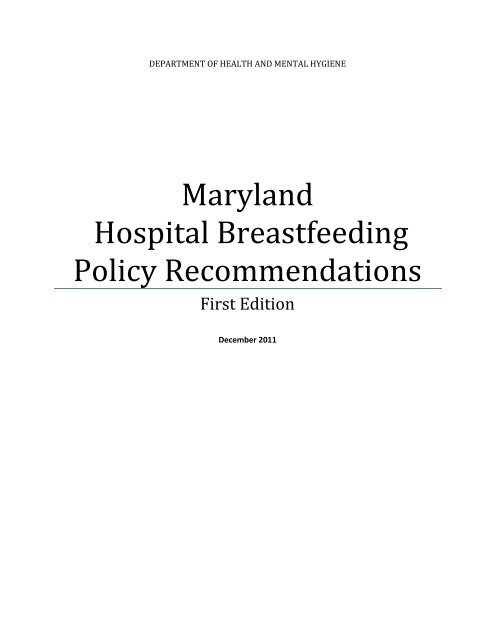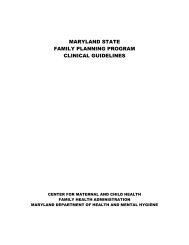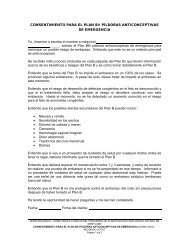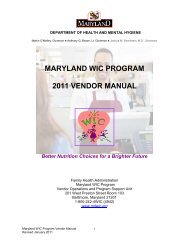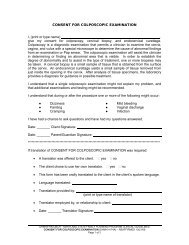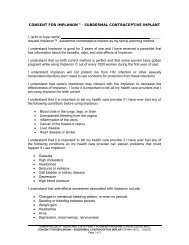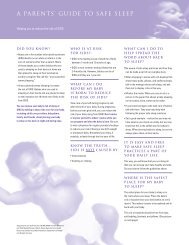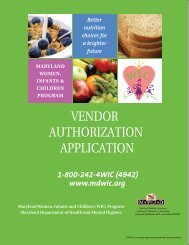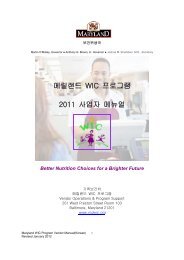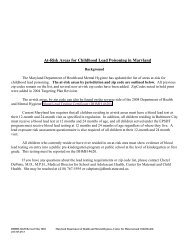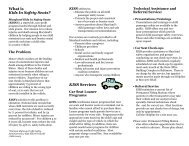Maryland State Model Hospital Breastfeeding Policy ...
Maryland State Model Hospital Breastfeeding Policy ...
Maryland State Model Hospital Breastfeeding Policy ...
Create successful ePaper yourself
Turn your PDF publications into a flip-book with our unique Google optimized e-Paper software.
DEPARTMENT OF HEALTH AND MENTAL HYGIENE<br />
<strong>Maryland</strong><br />
<strong>Hospital</strong> <strong>Breastfeeding</strong><br />
<strong>Policy</strong> Recommendations<br />
First Edition<br />
December 2011
First Edition <strong>Model</strong> <strong>Hospital</strong> <strong>Policy</strong> Committee<br />
Jackie Boras, MHS, RD, LDN<br />
Director, <strong>Maryland</strong> WIC Program<br />
<strong>Maryland</strong> Department of Health and Mental Hygiene<br />
Bonnie S. Birkel, CRNP, MPH<br />
Director, Center for Maternal and Child Health<br />
<strong>Maryland</strong> Department of Health and Mental Hygiene<br />
Maura Dwyer, DrPH<br />
Health <strong>Policy</strong> Analyst, Center for Maternal and Child<br />
Health<br />
<strong>Maryland</strong> Department of Health and Mental Hygiene<br />
Erin Penniston, MSW<br />
Childhood Wellness Coordinator, Office of Chronic<br />
Disease Prevention<br />
<strong>Maryland</strong> Department of Health and Mental Hygiene<br />
Rachel Ready, MPP<br />
Health <strong>Policy</strong> Analyst, <strong>Maryland</strong> WIC Program<br />
<strong>Maryland</strong> Department of Health and Mental Hygiene<br />
Audrey Regan, PhD<br />
Director, Office of Chronic Disease Prevention<br />
<strong>Maryland</strong> Department of Health and Mental Hygiene<br />
Amy Resnik, MS, RD, CSP, LDN, IBCLC<br />
<strong>Breastfeeding</strong> Coordinator, <strong>Maryland</strong> WIC Program<br />
<strong>Maryland</strong> Department of Health and Mental Hygiene<br />
Sherri Sabol, RD, LDN, CLC<br />
Chief, <strong>Breastfeeding</strong> Services, <strong>Maryland</strong> WIC Program<br />
<strong>Maryland</strong> Department of Health and Mental Hygiene<br />
S. Lee Woods, MD, PhD<br />
Medical Director, Center for Maternal and Child<br />
Health<br />
<strong>Maryland</strong> Department of Health and Mental Hygiene
Contents<br />
Introduction .................................................................................................................................................. 1<br />
Summary of <strong>Maryland</strong> <strong>Hospital</strong> <strong>Breastfeeding</strong> <strong>Policy</strong> Recommendations .................................................. 2<br />
#1 – Have a written breastfeeding policy that is routinely<br />
communicated to all health care staff. ............................................................................................. 3<br />
#2 – Train all health care staff in skills necessary to implement this policy. ............................................ 4<br />
#3 – Inform all pregnant women about the benefits and management of breastfeeding. ..................... 5<br />
#4 – Help mothers initiate breastfeeding within 1 hour of birth. ............................................................ 6<br />
#5 – Show mothers how to breastfeed and how to maintain<br />
lactation, even if they are separated from their infants. ................................................................. 7<br />
#6 – Give newborn infants no food or drink, other than breast milk,<br />
unless medically indicated. ............................................................................................................... 9<br />
#7 – Practice “rooming in” – allow mothers and infants to remain<br />
together 24 hours a day. ................................................................................................................. 11<br />
#8 – Encourage breastfeeding on demand. ............................................................................................ 12<br />
#9 – Give no pacifiers or artificial nipples to breastfeeding infants,<br />
unless medically indicated. ............................................................................................................. 13<br />
#10 – Foster the establishment of breastfeeding support groups and<br />
refer mothers to them on discharge from the hospital or clinic. ................................................. 14<br />
References .............................................................................................................................................. 15
Introduction<br />
There is extensive scientific evidence that breast milk is the optimal food for infants. Many professional<br />
organizations encourage breastfeeding, including the American Academy of Pediatrics, the American<br />
College of Obstetricians and Gynecologists, the American Academy of Family Physicians, the American<br />
College of Nurse-Midwives, the American <strong>Hospital</strong> Association, the Association of Women’s Health,<br />
Obstetrics and Neonatal Nurses and the Academy of Nutrition and Dietetics, formerly the American<br />
Dietetic Association.<br />
Early infant feeding practices can affect growth and development in children, while significantly<br />
reducing risk for infections and chronic diseases such as diabetes, asthma, and obesity. The Centers for<br />
Disease Control and Prevention (CDC) reports that low rates of breastfeeding add $2.2 billion per year to<br />
medical costs nationally (CDC Vital Signs, August 2011). Unfortunately, mothers who want to breastfeed<br />
may have a hard time doing so without hospital support. Since most babies are born in the hospital,<br />
there is a clear opportunity for hospital personnel to enhance the initiation and continued success of<br />
breastfeeding. Ongoing education and support of breastfeeding mother/infant pairs will help increase<br />
the duration and exclusivity of breastfeeding.<br />
In response to the Surgeon General’s Call to Action to Support <strong>Breastfeeding</strong>, CDC <strong>Breastfeeding</strong> Report<br />
Card – United <strong>State</strong>s, 2011 and Maternity Practices in Infant Nutrition Care (mPINC) 2009 Survey, a<br />
workgroup was formed at the <strong>Maryland</strong> Department of Health and Mental Hygiene to review current<br />
hospital policies and compose breastfeeding policy recommendations. The following pages provide<br />
guidance in developing hospital policies. Implementation should be consistent with existing regulations.<br />
These recommendations apply to normal, healthy, full-term infants and are not intended to apply to the<br />
specific needs of high-risk infants.<br />
1
Summary of <strong>Maryland</strong> <strong>Hospital</strong> <strong>Breastfeeding</strong> <strong>Policy</strong> Recommendations<br />
#1: Have a written breastfeeding policy that is routinely communicated to all health care staff.<br />
#2: Train all health care staff in skills necessary to implement this policy.<br />
#3: Inform all pregnant women about the benefits and management of breastfeeding.<br />
#4: Help mothers initiate breastfeeding within 1 hour of birth.<br />
#5: Show mothers how to breastfeed and how to maintain lactation, even if they are separated<br />
from their infants.<br />
#6: Give newborn infants no food or drink, other than breast milk, unless medically indicated.<br />
#7: Practice “rooming in” – allow mothers and infants to remain together 24 hours a day.<br />
#8: Encourage breastfeeding on demand.<br />
#9: Give no pacifiers or artificial nipples to breastfeeding infants, unless medically indicated.<br />
#10: Foster the establishment of breastfeeding support groups and refer mothers to them on<br />
discharge from the hospital or clinic.<br />
2
#1 – Have a written breastfeeding policy that is routinely communicated to all health<br />
care staff.<br />
Intervention Comments<br />
Recommendations<br />
a. Create an interdisciplinary team (hospital<br />
administrators, physician and nursing staff,<br />
lactation consultants and specialists, nutrition<br />
staff, other appropriate staff, and parents) to<br />
develop and review breastfeeding policies<br />
annually.<br />
b. Communicate policy to all health care staff who<br />
provide care for mothers and their infants.<br />
c. Post breastfeeding policy as appropriate in<br />
appropriate form for intended audience including<br />
on website and other social media utilized by the<br />
facility.<br />
Best Practices<br />
a. Create a comprehensive breastfeeding policy<br />
addressing all Ten Steps and adhering to the<br />
International Code of Marketing of Breast Milk<br />
Substitutes and include above recommendations<br />
in hospital policy.<br />
3
#2 – Train all health care staff in skills necessary to implement this policy.<br />
Intervention Comments<br />
Recommendations<br />
a. Designate at least one hospital maternity staff<br />
member, who is thoroughly trained in<br />
breastfeeding physiology and management, to be<br />
responsible for ensuring the implementation of an<br />
effective breastfeeding training program.<br />
b. All staff with primary responsibility for the care of<br />
new mothers and their infants will complete<br />
comprehensive training on breastfeeding<br />
physiology and management, with annual updates<br />
and competency verification, as well as continuing<br />
education in breastfeeding and lactation<br />
management.<br />
Best Practices<br />
a. All providers who have privileges to provide care<br />
to new mothers and/or newborn infants will<br />
complete training (minimum of 3 credit hours)<br />
with annual updates in breastfeeding promotion<br />
and lactation management, as well as continuing<br />
education in breastfeeding promotion and<br />
lactation management.<br />
b. At least one hospital maternity staff member will<br />
be an international Board Certified Lactation<br />
Consultant (IBCLC) with designated time to focus<br />
on breastfeeding.<br />
c. All hospital staff, including support staff, will<br />
provide positive messages about breastfeeding to<br />
all mothers who deliver within the hospital.<br />
d. All hospital staff, including support staff, will not<br />
use formula marketing promotional items, such as<br />
pads, post-its, pens or any other items obtained<br />
from commercial formula companies or companies<br />
that violate the International Code of Marketing of<br />
Breast Milk Substitutes.<br />
4
#3 – Inform all pregnant women about the benefits and management of<br />
breastfeeding.<br />
Intervention Comments<br />
Recommendations<br />
a. Assure the availability of prenatal childbirth<br />
education classes, for all women pre-registered to<br />
deliver at the facility.<br />
b. Provide mothers with complete information about<br />
the benefits of breastfeeding for mother and baby<br />
and contraindications to breastfeeding so an<br />
informed feeding decision can be made.<br />
c. Provide mothers with commercial-free information<br />
on breastfeeding preparation and management.<br />
d. Recommend exclusive breastfeeding as the ideal<br />
nutrition for newborns, unless medically<br />
contraindicated.<br />
Best Practices<br />
a. The hospital will incorporate structured<br />
breastfeeding education, taught by an<br />
International Board Certified Lactation Consultant<br />
(IBCLC) in all prenatal classes.<br />
b. The hospital will provide a breastfeeding<br />
education program as soon after admission as<br />
possible.<br />
c. The hospital will refer all potential income-eligible<br />
women to the Supplemental Nutrition Program for<br />
Women, Infants and Children (WIC) to offer<br />
additional opportunities for breastfeeding<br />
education and support during prenatal and postpartum<br />
periods.<br />
5
#4 – Help mothers initiate breastfeeding within 1 hour of birth.<br />
Intervention Comments<br />
Recommendations<br />
a. Document a woman’s desire to breastfeed in her<br />
medical record, her infant’s medical record, and on<br />
her infant’s bassinet.<br />
b. Allow early breastfeeding (within 1 hour of birth)<br />
to take place in the delivery room and/or recovery<br />
area.<br />
c. Encourage skin-to-skin contact on mother’s chest<br />
as the preferred source of body warmth, unless<br />
medically contraindicated.<br />
Best Practices<br />
a. <strong>Hospital</strong> maternity staff will encourage infant to be<br />
held skin-to-skin on mother’s chest at birth or<br />
soon thereafter. The administration of vitamin K<br />
and eye ointment and the measurement of weight<br />
and length will be delayed for the first hour after<br />
birth to allow uninterrupted mother-infant contact<br />
and breastfeeding.<br />
b. <strong>Hospital</strong> maternity staff will encourage exclusive<br />
breastfeeding throughout the hospital stay, unless<br />
medically contraindicated.<br />
c. <strong>Hospital</strong> maternity staff will inform a mother when<br />
breastfeeding is medically contraindicated<br />
including:<br />
the specific contraindication<br />
whether she can express breast milk<br />
during that time (for her infant or to<br />
discard) and<br />
what criteria need to be met before she<br />
can resume breastfeeding.<br />
6
#5 – Show mothers how to breastfeed and how to maintain lactation, even if they are<br />
separated from their infants.<br />
Intervention Comments<br />
Recommendations<br />
a. Provide instruction and assistance to each<br />
maternity patient who is breastfeeding to facilitate<br />
lactation.<br />
b. Provide mothers, including those who have infants<br />
with special needs when mother and infant(s) are<br />
hospitalized at the same facility, information about<br />
their breastfeeding progress and how to obtain<br />
help to improve their breastfeeding skills from a<br />
hospital staff member, trained in breastfeeding<br />
support and breast milk expression.<br />
c. Allow and encourage mothers to breastfeed their<br />
babies in the neonatal intensive care unit, unless<br />
medically contraindicated.<br />
d. When feeding at breast is not possible make every<br />
attempt to have the baby receive his/her mother’s<br />
expressed milk until medically able to breastfeed.<br />
e. If a mother or baby is re-hospitalized in a<br />
maternity care facility after the initial delivery stay,<br />
make every effort to continue to support<br />
breastfeeding and provide a hospital-grade electric<br />
breast pump.<br />
Best Practices<br />
a. At least one hospital maternity staff member, who<br />
is thoroughly trained in breastfeeding<br />
management, will be available at all times to assist<br />
mothers with breastfeeding.<br />
b. <strong>Hospital</strong> maternity staff will instruct all<br />
breastfeeding mothers, provide written<br />
information and observe for ability to correctly<br />
demonstrate the following:<br />
Position the baby correctly at the breast<br />
Latch the baby to breast properly<br />
<strong>State</strong> when the baby is swallowing milk<br />
7
<strong>State</strong> that the baby should be nursed a<br />
minimum of 8 to 12 times a day, with<br />
some infants needing to be fed more<br />
frequently<br />
<strong>State</strong> age-appropriate elimination patterns<br />
List indications for calling a healthcare<br />
professional.<br />
Manually express milk from their breasts.<br />
c. <strong>Hospital</strong> maternity staff will instruct mothers of<br />
infants in the NICU how to hand express their milk<br />
and how to use a hospital-grade breast pump until<br />
their infants are ready to nurse.<br />
d. <strong>Hospital</strong> maternity staff will teach mothers proper<br />
handling, storage, and labeling of human milk.<br />
e. Donor milk will be considered for a high-risk infant<br />
if mother and infant are separated and the mother<br />
is not able to express an adequate volume of milk<br />
for the infant.<br />
f. For mothers who require extended pumping, the<br />
hospital will provide medical orders for<br />
appropriate breast pumps and referral to a local<br />
durable medical equipment company or breast<br />
pump rental service.<br />
8
#6 – Give newborn infants no food or drink, other than breast milk, unless<br />
medically indicated.<br />
Intervention Comments<br />
Recommendations<br />
a. Do not give sterile water, glucose water and<br />
artificial milk to a breastfeeding infant without the<br />
mother’s informed consent and/or physician’s<br />
specific order.<br />
b. Have a sign on the infant’s bassinet clearly stating<br />
that the infant is breastfeeding and that no bottle<br />
feeding of any type is to be offered.<br />
Best Practices<br />
a. If possible, breastfed infants who cannot nurse at<br />
the breast will be fed in a manner that is<br />
consistent with preserving breastfeeding such as<br />
finger feeding, syringe feeding, or cup feeding.<br />
b. <strong>Hospital</strong> maternity staff will not place formula<br />
bottles, pacifiers or artificial nipples in a<br />
breastfeeding infant’s room or bassinet.<br />
c. <strong>Hospital</strong> maternity staff will inform mothers of the<br />
risks of supplementation to establishing and<br />
sustaining breastfeeding prior to non-medically<br />
indicated supplementation and document that the<br />
mother has received this information.<br />
d. <strong>Hospital</strong> maternity staff will provide a specific<br />
medical order when formula is provided to a<br />
breastfeeding baby and document the reason(s)<br />
for the provision of formula, the route, the form of<br />
supplement, and the amount given in the infant’s<br />
medical chart.<br />
e. The hospital will provide individual instruction in<br />
formula preparation and feeding techniques for<br />
mothers who have chosen formula feeding or for<br />
whom breastfeeding is medically contraindicated.<br />
9
f. The hospital will not accept free formula, breast<br />
milk substitutes, bottles or nipples.<br />
g. The hospital will store formula and supplies for<br />
formula feedings in a medication cart or separate<br />
storage space outside patient care areas.<br />
10
#7 – Practice “rooming in” – allow mothers and infants to remain together 24 hours<br />
a day.<br />
Intervention Comments<br />
Recommendations<br />
a. Establish and implement rooming-in for each<br />
patient, unless medically contraindicated.<br />
b. Allow mothers to breastfeed their babies at any<br />
time day or night.<br />
Best Practices<br />
a. <strong>Hospital</strong> maternity staff will not separate healthy<br />
mothers and infants during the entire hospital<br />
stay, including during nights and transitions.<br />
b. <strong>Hospital</strong> maternity staff will perform routine<br />
medical procedures in the room with mother and<br />
infant present, not in the nursery.<br />
11
#8 – Encourage breastfeeding on demand.<br />
Intervention Comments<br />
Recommendations<br />
a. Allow breastfed infants to feed on demand. The<br />
frequency and duration of breastfeeding should be<br />
infant-led, based on each infant’s early feeding<br />
cues, at least 8 times per day after the first 24<br />
hours.<br />
b. If a mother and infant are separated, hospital<br />
maternity staff will take the breastfeeding infant<br />
to the mother for feeding (if infant is medically<br />
stable) whenever the infant displays early infant<br />
feeding cues.<br />
c. <strong>Hospital</strong> maternity staff will teach mothers feeding<br />
cues and encourage each mother to feed as soon<br />
as her infant displays early infant feeding cues.<br />
d. <strong>Hospital</strong> maternity staff will document all feedings<br />
in the infant’s medical record.<br />
Best Practices<br />
a. <strong>Hospital</strong> maternity staff will encourage mothers to<br />
feed on demand and emphasize the importance<br />
and normalcy of frequent night feeds.<br />
12
#9 – Give no pacifiers or artificial nipples to breastfeeding infants, unless medically<br />
indicated.<br />
Intervention Comments<br />
Recommendations<br />
a. <strong>Hospital</strong> maternity staff will not offer pacifiers or<br />
artificial nipples to healthy, full-term breastfeeding<br />
infants.<br />
b. <strong>Hospital</strong> maternity staff will respect a mother’s<br />
decision to have her baby not receive any<br />
pacifiers.<br />
Best Practices<br />
a. The hospital will integrate skin-to-skin contact and<br />
breastfeeding into relevant infant care protocols<br />
to promote infant soothing and pain relief. If a<br />
pacifier is used during a procedure (circumcision),<br />
discard the pacifier immediately after the<br />
procedure.<br />
b. The hospital will not accept free or low-cost<br />
pacifiers.<br />
13
#10 – Foster the establishment of breastfeeding support groups and refer<br />
mothers to them on discharge from the hospital or clinic.<br />
Intervention Comments<br />
Recommendations<br />
a. Provide mothers with information about<br />
breastfeeding resources in their community,<br />
including information on availability of<br />
breastfeeding consultants, support groups and<br />
breast pumps, if applicable.<br />
Best Practices<br />
a. <strong>Hospital</strong> maternity staff will instruct all<br />
breastfeeding mothers, provide written<br />
information and observe for ability to correctly<br />
demonstrate the following upon discharge:<br />
Position the baby correctly at the breast<br />
Latch the baby to breast properly<br />
<strong>State</strong> when the baby is swallowing milk<br />
<strong>State</strong> that the baby should be nursed a<br />
minimum of 8 to 12 times a day, with<br />
some infants needing to be fed more<br />
frequently<br />
<strong>State</strong> age-appropriate elimination patterns<br />
List indications for calling a healthcare<br />
professional.<br />
Manually express milk from their breasts.<br />
b. The hospital maternity staff will facilitate motherto-mother<br />
and/or health care worker-lead support<br />
groups.<br />
c. When indicated, hospital maternity staff will<br />
provide a feeding plan and set up a follow-up<br />
lactation appointment.<br />
d. The hospital will refer all current participants and<br />
potential income-eligible women to the<br />
Supplemental Nutrition Program for Women,<br />
Infants and Children (WIC) for additional<br />
breastfeeding support.<br />
14
References<br />
Sample <strong>Hospital</strong> <strong>Breastfeeding</strong> <strong>Policy</strong> for Newborns. Safe and Healthy Beginnings: A Resource Toolkit for<br />
<strong>Hospital</strong>s and Physicians’ Offices. American Academy of Pediatrics; 2009.<br />
U.S. Department of Health and Human Services. The Surgeon General’s Call to Action to Support<br />
<strong>Breastfeeding</strong>. Washington, DC: U.S. Department of Health and Human Services, Office of the Surgeon<br />
General; 2011.<br />
Academy of <strong>Breastfeeding</strong> Medicine Clinical Protocol #7 (ABM #7): <strong>Model</strong> <strong>Breastfeeding</strong> <strong>Policy</strong> (Revision<br />
2010). <strong>Breastfeeding</strong> Medicine, Volume 5, Number 4, 2010.<br />
http://www.bfmed.org/Resources/Protocols.aspx<br />
<strong>Hospital</strong> Support for <strong>Breastfeeding</strong>: Preventing Obesity Begins in <strong>Hospital</strong>s. CDC Vitalsigns; August 2011.<br />
http://www.cdc.gov/VitalSigns/<strong>Breastfeeding</strong>/index.html<br />
Overcoming Barriers to Implementing The Ten Steps to Successful <strong>Breastfeeding</strong>: Final Report, Baby-<br />
Friendly USA, Inc.<br />
http://www.babyfriendlyusa.org/eng/docs/BFUSAreport_complete.pdf<br />
World Health Organization. (1981). International Code of Marketing of Breast-milk Substitutes<br />
(Document WHA34/1981/REC/1, Annex 3). Geneva: Author.<br />
United <strong>State</strong>s <strong>Breastfeeding</strong> Committee (USBC). Implementing the Joint Commission Perinatal Care Core<br />
Measure on Exclusive Breast Milk Feeding. Revised. Washington, DC: United <strong>State</strong>s <strong>Breastfeeding</strong><br />
Committee, 2010.<br />
http://www.usbresatfeeding.org/HealthCareSystem/<strong>Hospital</strong>MaternityCenterPractices/ToolkitImpleme<br />
ntingTJCCoreMeasure/tabid/184/Default.aspx<br />
World Health Organization/UNICEF. Baby Friendly <strong>Hospital</strong> Initiative: Revised, Updated and Expanded<br />
for Integrated Care. World Health Organization, UNICEF, 2009.<br />
http://www.unicef.org/newsline/tenstps.htm<br />
Last Updated: December 20, 2011<br />
15


